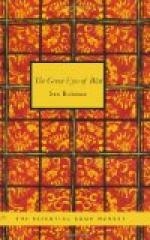“It was this: if on the following night Sir Marcus should present himself she was to tell him that Miss Merlin would take supper in his company after the performance, but that he was to observe every possible precaution. Marie, according to her account, at first declined to entertain the proposal, but being informed that it was merely intended to play a practical joke upon the baronet, she ultimately consented. I may add that the promise of a ten-pound note undoubtedly hastened her decision and it was on her receipt of the amount by post on the following morning that she determined to carry out her part of the bargain.
“Her instructions had been explicit. She was to tell Sir Marcus that Miss Merlin would see him after the performance, then when he presented himself, to inform him that her mistress had decided it would be more prudent for him to proceed to the rendezvous alone, where she would join him in a quarter of an hour. She was to give him the door key (which had arrived with the money) and to direct him to enter and wait in the room on the right of the hall. A cabman who knew the address would be waiting at the stage door.”
Gatton paused, puffing slowly at his pipe, then: “Unknown to Miss Merlin,” he continued, “this scheme was carried out. Sir Marcus presented himself at ten o’clock and received Marie’s message; he returned about eleven and she told him, as she had been instructed, that her mistress would join him in a quarter of an hour. Curiosity respecting the joke which she believed was being played upon the baronet prompted her to go outside the stage-door to see if there was actually a cab waiting. There was, and she heard Sir Marcus ask the man if he knew the address to which he was to drive.
“The cabman replied that he did, and Marie claims to know no more about the matter, except that Sir Marcus drove off in the cab, and that her mistress returned to her flat alone about a quarter of an hour later. Next point. Inquiries for the cabman have been made at all the ranks since early this morning, and he turned up at the Yard about a couple of hours ago. His story is simple enough; some one called up the rank where he chanced to be standing that evening, instructing him to call for Sir Marcus at the stage-door of the New Avenue Theater and to drive him to—”
He paused:
“Yes?”
“To the Red House!”
“At last we have it!” I cried excitedly.
“There is no doubt of it,” answered Gatton; “the cabman drove him there, and it was certainly at the Red House that he met his death. Indeed the cabby appears to be the last witness who spoke to the murdered man. He inquired his way to the Red House from a chance pedestrian, a tramp, whom he met at the corner of College Road. He has even described this person to us, but I don’t think his evidence of sufficient importance to justify our searching for him. On reaching the Red House the cabman and his fare found it to be vacant. Sir Marcus, however, who had a very brusk manner with his inferiors, having paid the cabman, curtly dismissed him, and the man, who admits having bargained for a double fare for the journey, because it was such an out-of-the-way spot, drove away vaguely curious, but not so curious as another might have been, since London cabmen are used to strange jobs.”




